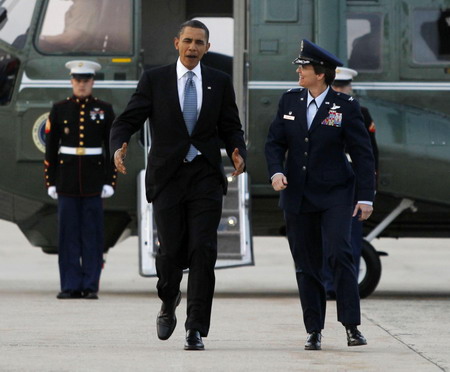Photos
Obama and Medvedev set to sign disarmament treaty
(Agencies)
Updated: 2010-04-08 10:29
 |
Large Medium Small |
|
 US President Barack Obama (L) walks to Air Force One at Andrews Air Force Base April 7, 2010, as he flies to Prague to sign the new Strategic Arms Reduction Treaty (START II) with Russian President Dmitry Medvedev. [Agencies] |
PRAGUE -- The United States and Russia will sign a disarmament treaty in Prague on Thursday that could herald better bilateral ties and help President Barack Obama raise pressure on countries seeking to develop nuclear weapons.
Obama was due to land in Prague early on Thursday and join Russian President Dmitry Medvedev for a signing ceremony at the medieval Prague Castle, where a year ago Obama set out his goal to work towards a world without nuclear weapons.
Medvedev said upon arriving in Prague on Wednesday that the treaty could play a considerable role in shaping disarmament in the future.
Obama will meet Medvedev before the signing and is expected to press him to support tougher UN sanctions against Iran. Steven Pifer, an arms control expert at the Brookings Institution, said the pact with Russia would give the US delegation more credibility at the non-proliferation conference.
"If the United States and Russia were to show up with no agreement and between the two of them controlling 95 percent of the weapons, it's pretty easy for the non-nuclear states to say, 'well you're not doing your part, why should we?'," Pifer said.
Obama's new nuclear strategy document unveiled this week forswears the use of atomic weapons against non-nuclear countries, a break with a George W. Bush-era threat of nuclear retaliation in the event of a biological or chemical attack.
The assurance applies only to countries in compliance with the nuclear Non-Proliferation Treaty, so Iran would not receive that commitment.
Washington and Moscow have plenty of differences on issues ranging from Iran to missile defence.
On Tuesday, Russian Foreign Minister Sergei Lavrov repeated Moscow's threat to withdraw from the START II treaty if US plans for missile defence threatened Russia.
Obama has put a priority on trying to "reset" relations with Moscow that hit a post-Cold War low during Russia's 2008 war with Georgia, and the treaty could help that.
The successor to the 1991 Strategic Arms Reduction Treaty would limit operationally deployed nuclear warheads to 1,550, down nearly two-thirds from START I.
On Thursday following the signing, Obama will dine with 11 heads of state from eastern and central Europe. Czech diplomats said the meeting was designed to reassure former Soviet bloc countries that resetting relations with Russia would not diminish US interests in the region.











